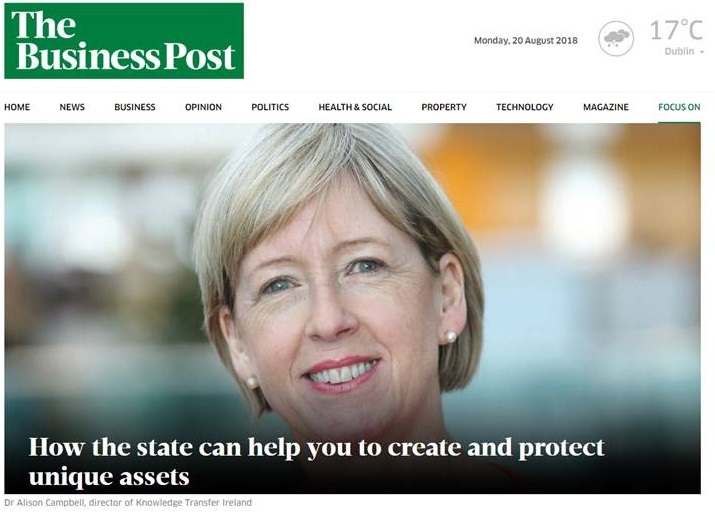
'An investment in knowledge pays the best interest,’ uttered one of the U.S. founding fathers Benjamin Franklin. The inventor and scientist, who came up with creations such as the lightning rod, the glass harmonica and bifocal glasses, understood the importance of researching, developing and then protecting his inventing processes.
Intellectual property (IP), that intangible asset which results from creative and research focussed endeavours, can indeed pay the best interest if the beholder recognises its unique value and takes the correct steps to protect it.
Because IP, in its many forms including copyrights, patents and trademarks, is at the basis of invention and development.
Indeed, some of the wealthiest businesses in the world now rely upon intellectual property rights (IPRs) rather than tangible assets, prone to value fluctuations, such as land, steel, coal or oil.
So, it’s little wonder successive Irish Governments have worked to ensure our approach to IP is proactive, faciliatory and helpful. To make us known as an agile knowledge-based economy.
“In an international context Ireland would be considered a very favourable environment for protecting IP,” said Dr Alison Campbell, Director of Knowledge Transfer Ireland (KTI).
“We actively assist companies to understand just why IP is such a very valuable asset. And practical supports have been put in place to help industry at every step. It’s so important that it’s easy to locate information on how to protect IP but also to understand how it can be developed.”
The protection of IP is clearly of importance when it comes to ensuring competitors can’t mirror a particular discovery, method or product, but it also adds value to your business.
“If looking to sell your business or seek investment then the value of your IP will obviously be considered when potential buyers or investors look at your register of assets. The process of registering IP is not overly arduous and so, when you consider its value to your business, it makes sense to secure its protection,” said Dr Campbell.
Working with Irish industries KTI’s mission is to make it simple for companies to engage with, and benefit from, publicly funded research in Ireland.
Approximately €700m is invested by the Government in the public research system each year which has now built a multi-billion euro research and development (R&D) resource of international repute.
In essence the IP gleamed from this public research can be utilised by Irish industry and potentially used to create their own IP.
“We aim to develop resources for industry to help companies understand how, where and when they might work in the research system to boost their R&D and drive innovation,” said Dr Campbell.
“Ireland wants to become a global innovation leader and how we treat IP is a crucial element of that. So, our aims include increasing collaboration between firms and the Irish research system as well as increasing the accessibility of information about the research base and about enterprise research, development and innovation supports.”
Incentives to innovate, to invest in research and to create IP, are many and varied and include the ‘Knowledge Development Box’ whereby companies can claim back tax in respect of revenue generated from IP.
But understanding the true value of IP and its status without an organisation goes further than merely protecting it from use or replication by others.
“The databases of Intellectual Property across the globe can be so very useful to companies in terms of looking at what competitors are doing,” said Dr Campbell.
“Also the information given on free sites such as the European Patent Office’s Espacenet informs a company how it can avoid infringing on existing IP protections. This, of course, is very valuable information so they can avoid incurring penalties in error. And lastly by looking through the IP registrations you can identify possible customers or companies with whom you could collaborate in the future.”
The work of KTI in raising awareness of IP, and helping companies to identify and act upon it, is clearly having an impact here.
The results of the Annual Knowledge Transfer Survey (AKTS) which tracks engagement and commercialisation activity between the commercial sector and Ireland’s research performing organisations found that in 2017 there were 164 new licences to IP signed with companies .
In addition, there were just over 1,300 live research collaboration agreements with industry illustrating the value to companies or innovating with the research base and 24 new products and services were launched on the market as a result of a licence.
“It’s a vibrant area of modern business and of course IP can be generated across all sectors from the likes of bio-medical where patent protections may be filed to Information and Communications Technology (ICT) which focuses on software copyrights and all the way to creative arts. In some cases it makes sense to have blended protection. It’s best to visit our website to get an understanding of IP and how you can use this asset us at KTI, and then consult an IP lawyer if you’re looking to register your IP,” said Alison Campbell.
By Graham Clifford
https://www.businesspost.ie/
20/08/18